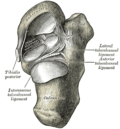Mueller–Weiss syndrome

Editor-In-Chief: Prab R Tumpati, MD
Obesity, Sleep & Internal medicine
Founder, WikiMD Wellnesspedia &
W8MD medical weight loss NYC and sleep center NYC
| Mueller–Weiss syndrome | |
|---|---|
 | |
| Synonyms | Brailsford disease |
| Pronounce | N/A |
| Specialty | Orthopedics, Podiatry |
| Symptoms | Foot pain, midfoot pain, arch pain |
| Complications | N/A |
| Onset | Typically in adulthood |
| Duration | Chronic |
| Types | N/A |
| Causes | Unknown, possibly vascular insufficiency |
| Risks | Female gender, obesity, trauma |
| Diagnosis | Clinical examination, X-ray, MRI |
| Differential diagnosis | Osteoarthritis, stress fracture, Köhler disease |
| Prevention | None known |
| Treatment | Orthotics, pain management, surgery |
| Medication | N/A |
| Prognosis | Variable, can lead to chronic pain |
| Frequency | Rare |
| Deaths | N/A |
Mueller–Weiss syndrome (MWS), also known as Spontaneous Osteonecrosis of the Tarsal Navicular in Adults, is a rare, spontaneous osteonecrosis of the tarsal navicular in adults. It was first described by Mueller and Weiss in 1927.
Etiology[edit]
The exact cause of Mueller–Weiss syndrome is unknown. However, it is believed to be due to a combination of biomechanical and vascular factors. The navicular bone is subjected to high compressive forces, which may lead to stress fractures and subsequent osteonecrosis. Additionally, the blood supply to the navicular bone is precarious, which may contribute to the development of osteonecrosis.
Clinical Presentation[edit]
Patients with Mueller–Weiss syndrome typically present with chronic, midfoot pain that is exacerbated by weight-bearing activities. Physical examination may reveal swelling and tenderness over the navicular bone.
Diagnosis[edit]
The diagnosis of Mueller–Weiss syndrome is primarily based on clinical presentation and imaging studies. Radiography is typically the first imaging modality used. However, MRI is more sensitive and specific in detecting early changes of osteonecrosis.
Treatment[edit]
The treatment of Mueller–Weiss syndrome is primarily conservative and includes rest, NSAIDs, and orthotic devices. In refractory cases, surgical intervention may be required.
Prognosis[edit]
The prognosis of Mueller–Weiss syndrome is variable. Some patients may experience resolution of symptoms with conservative treatment, while others may require surgical intervention. Long-term outcomes are generally favorable with appropriate treatment.
Gallery[edit]
-
Posterior view of the navicular bone
-
Anatomical illustration of the foot bones
See Also[edit]
NIH genetic and rare disease info[edit]
Mueller–Weiss syndrome is a rare disease.
| Rare and genetic diseases | ||||||
|---|---|---|---|---|---|---|
|
Rare diseases - Mueller–Weiss syndrome
|
| Orthopedic Conditions | ||||||||||
|---|---|---|---|---|---|---|---|---|---|---|
This orthopedic conditions related article is a stub.
|
Ad. Transform your life with W8MD's Budget GLP-1 injections from $75


W8MD offers a medical weight loss program to lose weight in Philadelphia. Our physician-supervised medical weight loss provides:
- Weight loss injections in NYC (generic and brand names):
- Zepbound / Mounjaro, Wegovy / Ozempic, Saxenda
- Most insurances accepted or discounted self-pay rates. We will obtain insurance prior authorizations if needed.
- Generic GLP1 weight loss injections from $75 for the starting dose.
- Also offer prescription weight loss medications including Phentermine, Qsymia, Diethylpropion, Contrave etc.
NYC weight loss doctor appointmentsNYC weight loss doctor appointments
Start your NYC weight loss journey today at our NYC medical weight loss and Philadelphia medical weight loss clinics.
- Call 718-946-5500 to lose weight in NYC or for medical weight loss in Philadelphia 215-676-2334.
- Tags:NYC medical weight loss, Philadelphia lose weight Zepbound NYC, Budget GLP1 weight loss injections, Wegovy Philadelphia, Wegovy NYC, Philadelphia medical weight loss, Brookly weight loss and Wegovy NYC
|
WikiMD's Wellness Encyclopedia |
| Let Food Be Thy Medicine Medicine Thy Food - Hippocrates |
Medical Disclaimer: WikiMD is not a substitute for professional medical advice. The information on WikiMD is provided as an information resource only, may be incorrect, outdated or misleading, and is not to be used or relied on for any diagnostic or treatment purposes. Please consult your health care provider before making any healthcare decisions or for guidance about a specific medical condition. WikiMD expressly disclaims responsibility, and shall have no liability, for any damages, loss, injury, or liability whatsoever suffered as a result of your reliance on the information contained in this site. By visiting this site you agree to the foregoing terms and conditions, which may from time to time be changed or supplemented by WikiMD. If you do not agree to the foregoing terms and conditions, you should not enter or use this site. See full disclaimer.
Credits:Most images are courtesy of Wikimedia commons, and templates, categories Wikipedia, licensed under CC BY SA or similar.
Translate this page: - East Asian
中文,
日本,
한국어,
South Asian
हिन्दी,
தமிழ்,
తెలుగు,
Urdu,
ಕನ್ನಡ,
Southeast Asian
Indonesian,
Vietnamese,
Thai,
မြန်မာဘာသာ,
বাংলা
European
español,
Deutsch,
français,
Greek,
português do Brasil,
polski,
română,
русский,
Nederlands,
norsk,
svenska,
suomi,
Italian
Middle Eastern & African
عربى,
Turkish,
Persian,
Hebrew,
Afrikaans,
isiZulu,
Kiswahili,
Other
Bulgarian,
Hungarian,
Czech,
Swedish,
മലയാളം,
मराठी,
ਪੰਜਾਬੀ,
ગુજરાતી,
Portuguese,
Ukrainian




